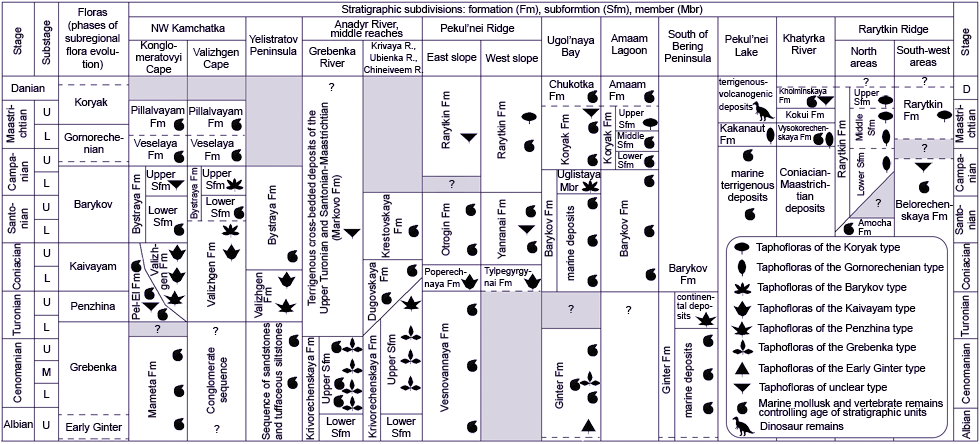Correlations
| North Pacific | AKSR-NASR | Anadyr-Koryak | Verkhoyansk-Chukotka | Okhotsk-Chukotka | N. Alaska | Yukon | Chignik |
|---|---|---|---|---|---|---|---|
| Phytostratigraphy | |||||||
Anadyr-Koryak Subregion (AKSR) of Northeastern RussiaThis chart shows the relative positions of the phytostratigraphic horizons found in Northeastern Russia, the associated chronostratigraphy and regional taphofloras. Clicking on the taphoflora symbols takes you to pages illustrating the material that is typical of those taphofloras. (Note: only those taphofloras covered in this website have active links.) Clicking on the Floras column takes you to descriptions of the different phases of floral evolution in Northeastern Russia.
|

The Anadyr-Koryak Subregion originated in the late Albian, when part of the Kamchatka–Koryak marine basin adjacent to the OCSR volcanic highland dried. Coastal alluvial lowlands and plains of the AKSR were covered with meandering rivers, lakes and swamps. Abundant plant remains were buried in terrigenous coal-bearing alluvial, lacustrine, and palustrine deposits of the subregion. Subsequent marine transgression resulted in a shallow shelf basin with numerous islands, and shallow-water marine sedimentation covered the continental deposits. As regards AKSR floral evolution, the Early Ginter (late Albian), Grebenka (late Albian – early Turonian), Penzhina (late Turonian), Kaivayam (Coniacian), Barykov (Santonian–early Campanian), Gornorechenian (?late Campanian – early Maastrichtian), and Koryak (early – late Maastrichtian – ?Danian) phases are recognised. All the late Albian – Danian floras of the AKSR, except for the oldest Early Ginter flora, are dominated by abundant and diverse angiosperms. The Early Ginter flora is regarded as a paleofloristic analogue of the Buor-Kemus flora of Northeastern Russia. |
